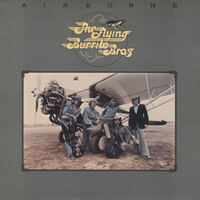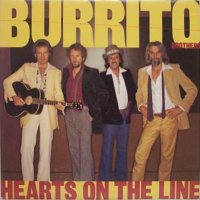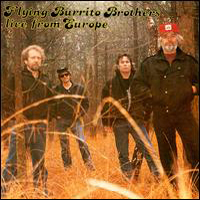
The Flying Burrito Brothers are an American country rock band best known for their influential 1969 debut album, The Gilded Palace of Sin. Although the group is perhaps best known for its connection to band founders Gram Parsons and Chris Hillman, the group underwent many personnel changes and has existed in various incarnations. Now officially known as The Burrito Brothers the band continues to perform and record new albums.
Gene Victor Parsons is an American drummer, banjo player, guitarist, singer-songwriter, and engineer, best known for his work with the Byrds from 1968 to 1972. Parsons has also released solo albums and played in bands including Nashville West, the Flying Burrito Brothers, and Parsons Green. Along with guitarist Clarence White, he is credited with inventing the B-Bender —a device which allows a guitarist to emulate the sound of a pedal steel guitar. The device is often referred to as the Parsons/White B-Bender, a trademarked name.

The Flying Burrito Bros is the third album by the country rock group, The Flying Burrito Brothers, released in the spring of 1971. Before recording sessions for the album began, Chris Hillman fired Gram Parsons from the band, leaving Hillman and "Sneaky" Pete Kleinow as the only original continuing members. In Parsons' place, the band hired a young unknown musician named Rick Roberts, who later was the primary lead singer of Firefall. Guitarist Bernie Leadon would also leave the band shortly after the album's release, going on to co-found the Eagles.

Flying Again is the fourth studio album by the country rock group The Flying Burrito Brothers, released in 1975.

Airborne is the fifth studio album by the country rock group The Flying Burrito Brothers, released in 1976.

Hearts on the Line is an album by the country rock group The Burrito Brothers, released in 1981.

Sunset Sundown is an album by the country rock group the Burrito Brothers, released in 1982. It was produced by Michael Lloyd.

Cabin Fever is a live album by the country rock group The Flying Burrito Brothers, released in 1985.

Live from Europe is a live album by the country rock group The Flying Burrito Brothers, released in 1986. It contains songs recorded live for a Dutch radio broadcast and features the same lineup as Cabin Fever. Skip Battin would leave the band in mid-1986 and be replaced by David Vaught for some shows.

Clyde "Skip" Battin was an American singer-songwriter, bassist, performer, and recording artist. He was a member of the Byrds, the New Riders of the Purple Sage, and the Flying Burrito Brothers.

Sleepless Nights is a posthumous compilation album by Gram Parsons. Credited to Parsons and his former band The Flying Burrito Brothers, the band appear on nine of the album's twelve tracks. The album features no original songs; the majority are covers of vintage country songs; the exception is The Rolling Stones' song "Honky Tonk Women".
Swampwater was an American country rock band, that formed and started out initially as Linda Ronstadt’s backing group in the late 1960s, soon after she went solo. They are famous for incorporating cajun and swamp rock elements into their music. Its members included cajun fiddler Gib Guilbeau, John Beland, before either of them joined The Flying Burrito Brothers, with Stan Pratt, Thad Maxwell, and Eric White. Swampwater would go on to back Ronstadt in 1971 on TV's The Johnny Cash Show, and their appearance on the show would help Swampwater secure a recording contract with RCA.
Nashville West was a short-lived American country rock quartet, that was briefly together in the late 1960s. The group comprised multi-instrumentalist Gene Parsons, guitarist Clarence White, singer-guitarist-fiddler Gib Guilbeau and bassist Wayne Moore. Parsons and White left the band to join The Byrds while Guilbeau and Parsons later joined the Flying Burrito Brothers.
John Christopher Ethridge was an American country rock bass guitarist. He was a member of the International Submarine Band (ISB) and The Flying Burrito Brothers, and co-wrote several songs with Gram Parsons. Ethridge worked with Nancy Sinatra, Judy Collins, Leon Russell, Delaney Bramlett, Johnny Winter, Randy Newman, Graham Nash, Ry Cooder, Linda Ronstadt, The Byrds, Jackson Browne, and Willie Nelson.

Hot Burritos! The Flying Burrito Brothers Anthology 1969–1972 is an album by the country rock band the Flying Burrito Brothers. It was released in 2000. A forty-three song compilation on two CDs, it includes all of their first three albums — The Gilded Palace of Sin (1969), Burrito Deluxe (1970), and The Flying Burrito Bros (1971) — along with eleven additional songs.

Eye of a Hurricane is the 6th studio album by The Flying Burrito Brothers, released in 1994. In the early 1990s, longtime Flying Burrito Brothers members John Beland, Gib Guilbeau, Sneaky Pete Kleinow and Chris Ethridge teamed up with Australian rock legend, Brian Cadd and former Elvis Presley drummer, Ronnie Tutt, to form a brand new version of Burritos. The sessions took place at Brian Cadd's studio in Franklin, Tennessee and the material was mostly written by Beland, Cadd and Guilbeau, with one song contributed by Ethridge. Beland and Cadd produced the album for Magnum Records, in London England. In support of the album, Beland, Cadd, Kleinow and Guilbeau toured Europe in the early 90s, playing clubs and concerts. Ethridge surprisingly vanished only days before the tour, leaving the band to quickly hire Nashville bassist Larry Gadler, as well as Bobby Bare's drummer Gary Kubal. The tour yielded a live album called Live in Europe, also on Magnum.
Floyd August "Gib" Guilbeau was an American Cajun country rock musician and songwriter. As a member of Nashville West, Swampwater, The Flying Burrito Brothers, and later The Burrito Brothers, Guilbeau helped pioneer the fusion of rock and country music in the 1960s.

California Jukebox is the 7th studio album by The Flying Burrito Brothers, released in 1997. The album is a fair mix between original and cover songs. The cover songs are an interesting mix between older and more established acts such as Neil Young and Buck Owens as well as newer alt-country acts such as Son Volt and The Jayhawks. The album also features guest appearances by Waylon Jennings, Charlie Louvin and former band members such as Brian Cadd and Al Perkins.

Georgia Peach is the first release by Burrito Deluxe. After John Beland retired The Flying Burrito Brothers in 2000, original member of that band "Sneaky" Pete Kleinow put together a new lineup with Carlton Moody and Tommy Spurlock. As Beland still had rights to the name, the band decided to call itself Burrito Deluxe after the Flying Burrito Brothers' second album. In addition to a mixture of original tunes and covers, the album contains several redone version of Flying Burrito Brothers and other songs associated with Gram Parsons.
The following is a comprehensive discography of The Flying Burrito Brothers, an American country rock band which has evolved over time and released material under several different names. Their initial recordings were led by Gram Parsons and Chris Hillman who had recently left The Byrds. Parsons was replaced by Rick Roberts who continued to tour with the band even after the departure of Hillman. By 1975 a new lineup focused around Gib Guilbeau and other Byrds alumni such as Skip Battin and Gene Parsons. In 1977 the band recorded an album that their record company released under the name "Sierra" much to their surprise. By the 1980s, and after several lineup changes, the band was mostly associated with Gib Gilbeau and John Beland. They relented to record company pressure and once again changed the name of the band to just "The Burrito Brothers". Sneaky Pete Kleinow's pedal steel guitar playing was generally the only constant with each lineup change during this era.















